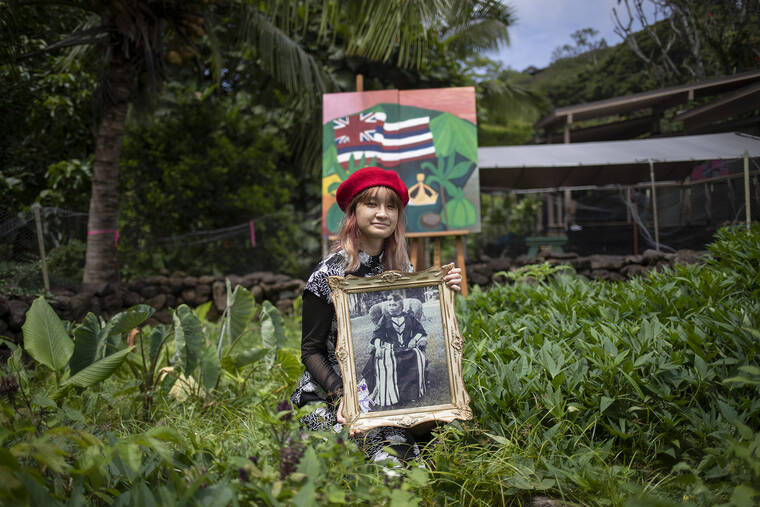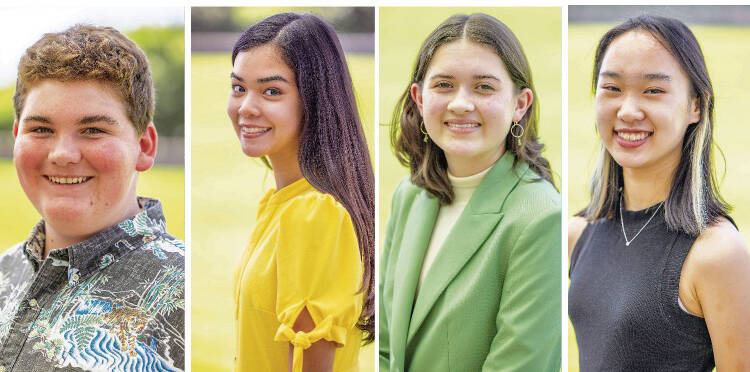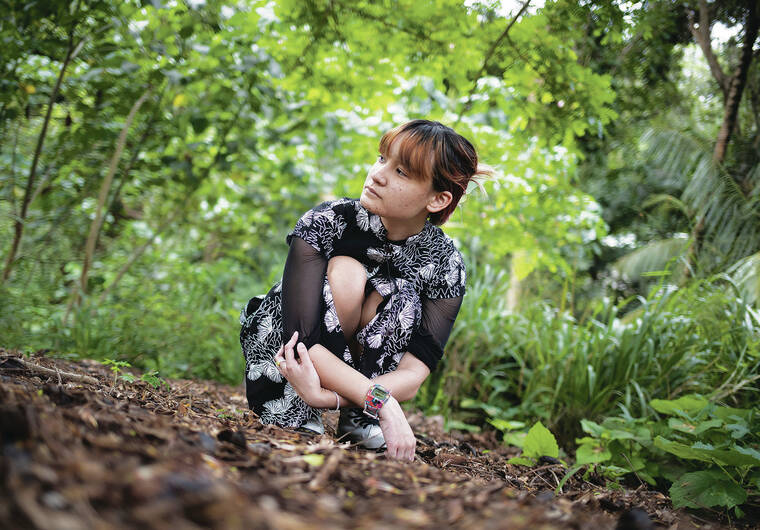Kalehua Fung, a recent graduate of a Native Hawaiian charter school, has long admired the steadfast courage of the deposed Queen Lili‘uokalani and her ability to compose works of art in the midst of turmoil.
Fung sums it up this way: “… if you have faith, your messes can turn into beauty,” a line in the poem that won her the 2022 Hawai‘i Youth Poet Laureate award on April 30 from the Maui Arts & Cultural Center (MACC).
She clinched the statewide award for her “Ode to Messes” in the second year of the poetry-writing contest for youth, ages 10 to 18, competing against 12 other finalists. The Maui arts center held workshops via Zoom for teachers and students in the spring, and organized the culminating event in collaboration with Urban Word, which founded the National Youth Poet Laureate Program in 2008.
Moira Pirsch, education director of MACC, said the students’ poems display the great diversity and power of Hawaii’s youth. “(They) tell us who they are, what is important to them, and where we all need to turn to address our community’s greatest challenges.”
Fung, who is a 2021 graduate of the Halau Ku Mana Public Charter School in Makiki Heights, said putting her thoughts and feelings into poetic form has become second nature since she was first assigned to writing a poem in the eighth grade. Since then, she’s written “maybe a thousand poems, though they’re not as long or as strong as the poems I submitted (to the contest).
“I like writing; it honestly comes from my genealogy, my ohana, our culture — being Native Hawaiian, it’s in our blood.”
>> RELATED: Mid-Pacific Institute senior wins Hawai‘i Poetry Out Loud contest
While Queen Lili‘uokalani has been acclaimed for her songwriting (which she continued while incarcerated), Fung’s poem centers around the patchwork quilt sewn while the queen was held prisoner in Iolani Palace. The quilt documents significant events beginning with her imprisonment in 1895, following the overthrow of the Hawaiian monarchy in 1893.
“(The quilt) is one of the only things we have from her, physically, from that time,” said Fung. “We don’t have a lot of her dresses, we have some of her jewelry but a lot of what happened in her life, which was a very important time for Native Hawaiians, is what was put into that quilt.”
Fung’s poem describes the queen’s creation of the quilt:
“Our Queen, Lili‘uokalani.
Held prisoner in her room.
As resplendent & efficacious as she was,
She too was held amongst a mess.
Used her tears as thread,
Her sorrow as fabric,
And sewed together the most alluring creation our eyes have ever seen.
A quilt birthed from messes,
Her pride & love poured into the colors …”
Fung said she would like to emulate the queen by being steadfast in her culture.
“She was just very rooted in aloha for her people and her aina, and that inspires me as a Native Hawaiian. She was strong with her voice, but not in like an in-your-face way, it was like a gentle way when she wrote songs and poetry.”
Pirsch said among the contest’s extremely talented finalists, Fung “definitely stood out, she was clearly the top winner” for her writing prowess, evident in three poems submitted. While the students received some coaching on their performances, the contest focused on writing ability and also considered their degree of civic engagement.
Pirsch praised the way Fung relates her personal perspective — from the standpoint of her own messy room and the angst of growing up — to that of an iconic figure only read about in history books. “She brings the reader right there in the same room of Queen Lili‘uokalani, just humanizing her.
“That’s one of the beautiful things Kalehua has done with her work. She brings us to remember that (the queen) was this incredible human and that we all have the potential to make — what does she say? — butterflies out of our messes.”
The concluding line in Fung’s poem reads:
“This is an ode to messes,
Because from it,
The most magnificent butterflies are created.”
Poetry has been riding a momentum of popularity in recent years, Pirsch said, and many young poets were inspired to see Amanda Gorman deliver a stirring performance of her work, “The Hill We Climb,” at the 2021 presidential inauguration ceremony. It helped them to see poetry, expressively read aloud, as a subject more exciting and relevant to people’s lives instead of a classroom topic usually considered boring and old-school, she said. (While the program was formed years earlier, it was in 2017 that Urban Word named Gorman its inaugural National Poet Laureate.)
Students also find more freedom of style and content in the contemporary style of poetry-writing, which doesn’t require words to rhyme in the traditional mode, Pirsch said.
The MACC event’s top five finalists, in addition to Fung, were Kealoha Comcowich, Lyric Kensington Ono, Miya Peterson and Nicole Dao, all of Punahou School. Lua Bowman, the state’s first poet laureate named in 2021, was also a Punahou student and led some of the student workshops this year.
The co-hosts of the event, Travis Kaulula‘au Thompson and Ittai Wong, led a majority of the MACC workshops. Thompson is a nationally ranked slam poet and educator. Wong is a multidisciplinary artist, educator, a published poet and a two-time international grand slam champion.








